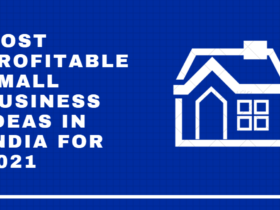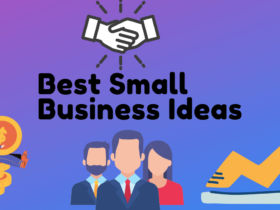What Is a Business?
A business is described as a system or entrepreneur which plugs are engaged in industrial or approved activities. The business profits can be things or they can be non-profit association, which are driven to fulfill a charitable purpose or additional social reasons.
Term “business” is to be output to conduct the benefits of efforts and activities of individuals and selling refers to goods and services. Trading range in scale from a sole proprietorship to an international corporation. Several lines of theories are engaged with an understanding of business administration, including organizational behavior, organization theory, and strategic management.
Starting a new small business?
- You want to make sure you prepare thoroughly before starting a business, but realize that things will almost certainly go awry. To run a successful business, you must adapt to changing situations.
- Conducting in-depth market research on your field and the demographics of your potential clientele is an important part of crafting a business plan. This involves running surveys, holding focus groups, and researching SEO and public data.
- Before you start selling your product or service, you need to build up your brand and get a following of people who are ready to jump when you open your doors for business.
- This article is for entrepreneurs who want to learn the basics steps of starting a new business.
Read Also: Fast Way to earn money from Online treading option
8 Steps to start a business
Step 1. Ask Yourself if You’re Ready
There will never be a perfect time to start a business. Stars can not align to Romeo and Juliet, they probably will not be the same for you. But you can see that as the fact that you hold back to start today or use is that you push start.
When it comes down to deciding if you’re ready to start a business, it is more about attitude than time. In the frame of mind you’re still win? You did not heck yeah yell at your computer screen, then to re-examine, you may need entrepreneurship is the right way for you.
The reality is saying that you are going to start a business is easy. However, it changed nothing that makes some money doing it, that could be a whole lot tougher.
And if you need to be prepared to take some on mentally. Why? Well, there are being challenged like advertisements that generate sales. And if your mind is not in the right place, any failure can destroy. But if you are in the right mindset, you’ll Kapow! Failures you until finally starts hitting his big win.
Step 2. Write a business plan
Your business plan is essentially a blueprint for its startup, keep on track and guide during their visit. This document can be as simple or as deep as you want, but most include the following elements:
- Executive summary. A brief background on your company – what it is, what it does, and why.
- Mission statement. A short statement describing your business’s purpose.
- Market analysis. An extensive analysis derived from your market research.
- Company description. A section addressing what problem your company solves and why it is unique.
- Organization and management. A list of the owners and executives, as well as key staff members.
- Marketing and sales. An overview of your strategy for targeting consumers based on your market research.
- Service or product line. Descriptions of your products and services, and how they will be delivered to customers.
- Funding request. How much funding you need and why, and how you plan to pay back any borrowed money.
- Financial information. Projections including cash flow statements, income statements, balance sheets, collateral, and current costs.
Step 3. Choose a Business Model
After coming up with a business idea, think about how you are going to execute it in your niche. This is where comes into play business model.
Business model is that you have a strategy to provide value with their idea and are going to make money off of your customer base.
When How does one learn how to start a business, try to do some more tests help to know about the business model.
Here are six types of business models to consider:
- Affiliate Marketing: Promote other businesses ’ products and services online, and receive a commission for each sale you make with this passive income idea.
- Freelancing: Provide a service to other individuals and businesses using a skill that you have, such as advertising, writing, designing, or programming.
- Coaching and Consulting: Become a coach or a consultant and sell your expertise, advice, and guidance.
- Information Products: Package and sell your expertise in ebooks, worksheets, templates, and online courses.
- Software as a Service (SaaS): Create a piece of software or application, and charge users a recurring subscription fee.
- Ecommerce: Use a service like Shopify to set up a website and sell physical products online.
Step 4. Conduct market research
Every business needs to know who its customers are. Conduct some market research. This is especially important right now, given the current economic environment and to understand typical consumer behavior, pain points, and market trends in your chosen industry, so that you can see where your potential startup might fit in. How specific consumer activities and lifestyles have changed in the light of COVID-19.
Your research should answer each of these questions:
- Demand. What, if any, are some desired products or services in your given market?
- Market size. How many clients or consumers would make up your target audience?
- Market saturation. How many competitors are in your market with a similar concept?
- Pricing. What is the typical amount customers are willing to pay for products and services in your market?
- Consumer engagement. How have a similar product- or service-based businesses pivoted during the pandemic to engage consumers virtually? Have they moved their sales process online or entered the e-commerce space, and can you replicate that or do it better?
Step 5. Choose and register your business name
Once you choose not by someone else is a name that represents your business (and use), you can protect it by registering it.
- Entity name. Thus identifies your business for your home state. It protects your business name on the state level: Once you register, you can in your state and no one is using exactly the same business name. Below we’ll go over to enter your unit name.
- Trademark. Use of trademark registration of the same name stops in similar industries. It can protect your name and the goods or services at a federal level.
- Doing Business As (DBA). If you want to conduct business under their own personal name or additional alias of your formal business entity name, you may be required to have a DBA register with the state, county, or city where you do business. Check your local laws to require his home state to understand.
- Domain name. Secure an appropriate URL for your business’s website will ensure brand identity for its future customers. You can also create social media accounts on this point – even if you actively do not use them yet – make sure you get username or handle you want.
Step 6. Register Your Business
Some cities or states, you need to register your business until you have gained a certain amount of income or profit from it, if you look to your due diligence will be required by law applicable to you Is not.
However, some entrepreneurs register their businesses in a day to prevent liability. For example, if you are involved in a day and takes you to sue in the early stages of your business, hit your business instead. So, the sooner you incorporate your business, safe you are from a legal perspective (individually).
Of course, incorporated business is not the only type of enterprise at your disposal. You can also choose to become a sole proprietor or create a partnership business. You will need to trade structure to determine whether to start a business, do some research before you is the best for your situation.
Step 7. Create Your First Product or Service
To the products or services when starting a business are a number of things you can make to sell to your audience.
In e-commerce, you can choose from millions of uses Oberlo products that you can sell in any popular niche, such as fashion, jewelry, home decor, automotive, beauty, electronics, and more can do.
If you are an industry expert, you can create digital products such as e-books, courses, music, or other digital content to sell to others. You can earn from your expertise with products and upsell with services.
As for the software business, you can create a SaaS product that helps other businesses. Or if you are a consultant, you can offer speaking gigs, coaching, or your skillset.
Step 8. Promote Your Business
The most important part of starting a business promotion stage. Getting your business in front of people who will help you to generate sales, that turns your idea into a business. There are few ways you can promote your business idea:
- Facebook: You can run Facebook Ads by going after “broad” interests and including relevant brands as an interest to capture their audience. You can also post in Facebook groups as your fan page which is great for businesses with niche audiences.
- Instagram: Grow your Instagram followers so you can make sales with each Instagram post. You can also add direct links in Instagram Stories to capture more sales.
- Pinterest: Group boards are a great way to get visibility on your posts when you’re starting out. You can also create your own boards to promote your content. Be sure to promote other brand’s content to avoid triggering your account as spam.
- LinkedIn: Build your personal brand by creating posts and sharing thoughts on articles on LinkedIn. Invite relevant users to follow you to increase your reach.
- SEO: By optimizing your website for search and creating blog content you can generate more leads, email subscribers, and website traffic.
- Quora: Answer niche questions on Quora to promote your website. You can use SEO tools to find high-ranked Quora keywords to help increase your visibility on the platform.
- Clubhouse: Start a room where to spark discussions around your brand. You can also join other rooms related to your niche and communicate with other business owners. Try to build relationships so that people follow your profile and recommend your business to others.







